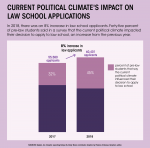More students may be applying to law school in response to recent controversies in national politics, a survey found.
A survey by Kaplan Test Prep in February surveyed law school admissions officers and found political climate was an important factor in the increase in law school applications in the U.S.
Law school applications increased by 8% last year, according to the survey.
According to the survey, 87% of admissions officers said they believed the current political climate played a big part in the increased number of applications.
The survey additionally reported that 45% of pre-law students said the current political climate affected their decision to apply to law school.
Rob Schwartz, the assistant dean of admissions and financial aid at UCLA School of Law, said in an email statement he thinks these results are not surprising. Schwartz said UCLA Law applicants’ admissions essays in the past two years have indicated the political climate as a factor in their desire to attend law school.
Schwartz added the number of applicants to UCLA Law increased by 14% in the 2017-2018 cycle, but the number of applicants remained the same in the 2018-2019 cycle.
Anthony Coloca, Kaplan Test Prep’s director of pre-law programs, said he thinks the link between politics and law makes sense.
“Throughout U.S. history, lawyers have always been an influential force in politics,” Coloca said. “Politics and legal professions have gone hand in hand for centuries, so it makes sense that they would be tied together.”
However, Coloca said he thinks students should be cautious about pursuing law school for political reasons.
“A lot of law school admissions officers are always pointing out that caring about politics alone is generally not a strong enough reason to attend law school because politics is changing so quickly all the time,” Coloca said.
Gary Blasi, a law professor emeritus, said he thinks politics are influencing law school applications because of recent media attention on important public issues.
Blasi added increased interest in law due to politics may be advantageous in the future.
“(Law students) are beginning to realize that the decisions being made now will have a very big effect on them and their future and their children, so I think it’s good that there’s more engagement in the political system – that’s what makes democracy function, after all,” Blasi said.
Laura Gómez, a law professor at UCLA, said she is skeptical that the increase in law school applications can be attributed to politics. Gómez said the recession in 2008 led to a decrease in law school applications and this recent increase may indicate the number of law school applications is normalizing, rather than rising due to the political climate.
Gómez added there has been an increase of students in the Critical Race Studies Program at UCLA Law, a specialization concerned with racial justice in legal practice. Gómez said she believes this increase might be due to controversies in national politics.
Yang Yang, a law student, said he thinks politics does not have a major effect on UCLA law students.
“I don’t think a lot of students choose to be in law school because of politics,” Yang said. “Currently I think most of our classmates are focused on business association and corporation laws, so I think basically most of the students are trying to make big money instead of seeking some position in the political area.”
The Kaplan Test Prep survey also found 46% of pre-law students said it is important for them to attend schools with peers of similar social and political views.
Blasi said he thinks this is unfortunate because more diverse communities with differing views are more conducive to learning.
“Everybody learned more when there was a more diverse set of opinions,” Blasi said. “(Law students) would be better served if they were engaging in conversation with people who don’t agree with them.”
Schwartz said prospective law students inspired by politics should ensure their passion will remain even after the political issues they care about are no longer relevant. He added the relationship between the political climate and law school interest can be advantageous.
“An advantage is that people who feel a passion to make a difference recognize that becoming a lawyer gives you extraordinary tools – not just a professional degree, but a deep understanding of the law and methods for thinking about and approaching complex situations – that will serve you well no matter what you do,” Schwartz said.
